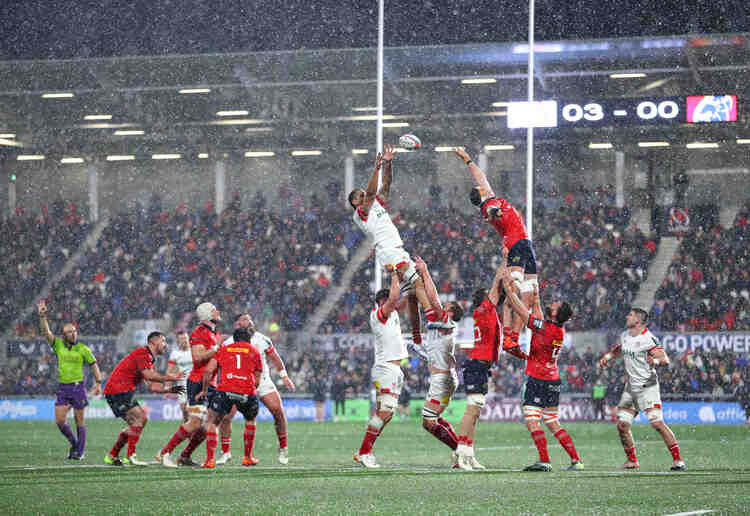County Laois native Robert Sheehan stars in “The Umbrella Academy,” a new series debuting on Netflixt tomorrow that is based on the comic book series of that name, and was seen most recently on cinema screens in "Mortal Engines." COURTESY OF UNIVERSAL PICTURES
By Karen Butler
Robert Sheehan says he could comfortably relate to his “Mortal Engines” character Tom Natsworthy, a historian forging a new life for himself in a vastly different environment than the one he had always known.
Raised in Portlaoise, Co. Laois and now a resident of London, Sheehan is famous for his roles in “Song for a Raggy Boy,” “Killing Bono,” “Geostorm,” “The Mortal Instruments: City of Bones,” “Bad Samaritan,” “Misfits” and “Love/Hate.” He will soon be seen in the Netflix series “The Umbrella Academy.”
“I’m very nomadic with my work, of course,” the 31-year old actor told the Irish Echo in a recent phone interview.
“I’m like an old shaman who followed a herd of reindeer around Northern Finland 1,000 years ago,” quipped the actor, who is the youngest son of Maria and former Garda Joe Sheehan. “Yeah, I go where work takes me and I find myself in foreign lands and new places all the time, but I think, if your head’s in the right place, it’s a great way to get to know yourself.”
Produced and co-written by “The Lord of the Rings” and “King Kong” filmmaker Peter Jackson, the adaptation of Philip Reeve’s sci-fi novel “Mortal Engines” takes place centuries after an international war triggered continental shifts, erasing borders and giving rise to massive, motorized “predator cities” that devour dwindling resources and smaller villages.
“Ireland did not fare well at all,” according to a map in the movie, Sheehan sadly confirmed.
“Ireland looked like a little, charred blip in the Atlantic. It’s like: ’What did the Irish ever do to you? Leave them alone!’”
Co-starring Hera Hilmar, Jihae, Stephen Lang, Hugo Weaving, Ronan Raftery and Patrick Malahide, the picture was filmed by director Christian Rivers in New Zealand. The tale takes off as Sheehan’s Tom discovers a terrible secret and is expelled into the great unknown from his home on the mobile version of London. He quickly joins forces with a group of rebels dedicated to stopping any further annihilation by his wheeled city, in the hope that the few surviving sedentary communities may live in peace.
Working on the movie made Sheehan ponder what could lead mankind to this point and what future generations might think of us.
“Tom is one of those future generations who’s kind of looking back to our age, shaking his head and going, ‘What a strange, destructive, fatalistic way that they lived their lives back then!’” he said. “I think we have a tendency to dehumanize humans who haven’t been born yet. People who haven’t shown up yet and will have to deal with all of the environmental problems that we are causing.”
The actor said he doesn’t exclusively look for projects with underlying messages, but appreciates when something he is attracted to also has a deeper meaning.
“If that balance is done correctly, it can really have a profound effect,” he noted. “‘Mortal Engines’ by its nature is satire and satire by its nature asks lots of questions or compels the audience to ask questions of themselves.”
Much is conveyed about the world of “Mortal Engines” from a quick museum tour Tom gives Katherine Valentine, a power-mad official’s kind-hearted daughter, played by Leila George.
Tom imparts to Katherine that the 21st century is known as the “Screen Era,” a time when humans appear to have forgotten how to write since no printed records from those years have ever been recovered.
“Real estate in a film is much sought after. [Dialogue] has to further the story along as efficiently as possible,” Sheehan said of the film’s lean, but well-crafted screenplay.
The fact that salvaged statues of the Minions cartoon characters are believed to be American deities in this world also makes the viewer wonder how much those who study the past actually get right.
“I’m not an authority on this, but what historians and anthropologists seem to do a lot, is that they seem to credit a lot of the things they find, to spiritual practice,” Sheehan explained, adding that, in reality, the objects that survive the longest tend to be those used for everyday, utilitarian purposes, not religious rituals.
“We have to make our best stab at understanding history as we can, but I think we do get a lot wrong. But we have to agree on a narrative and then get on with it.”
Personally, Sheehan is fascinated by history, making the role of Tom a good match for him.
“The older I get, the more of a thirst for knowledge I have. The more I want to understand the world around me,” he said. “And the more you understand about history, the more you understand about the present and probably the future.”








